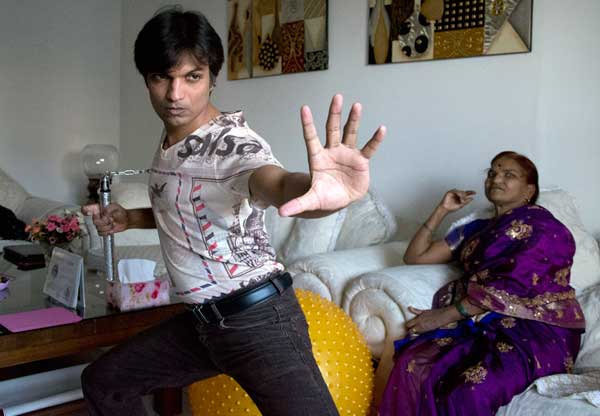

He straddles two cultures and plays a bridging role, and his introduction to all things Chinese was through a legendary kung fu hero. He tells Sun Ye who and what brought him to China.
Chaudhari Dilip Giridhar was short and puny, and bullied even by his own sister back home in Maharashtra, India. Now in China and under the name Chen Ailong, he's a sought-after Bruce Lee impersonator, handy with the nunchakus, swords and sticks.
 |
|
Chaudhari Dilip Giridhar shows his kung fu moves at his rented apartment in Beijing. Katherine Rodriguez / for China Daily |
And while he has never appeared on TV in India, he is a regular CCTV variety show celebrity guest.
Kung fu and the spirit of Jeet Kune Do brought on the changes, he tells us in his rented apartment in suburban Beijing.
A full-sized mirror stands on the balcony and Chaudhari tells us that this is his sparring partner. When he cannot find someone to practice with, he learns by looking into the mirror.
His fascination with kung fu began some 20 years ago when a friend teased him: "Look at you, how could you protect your family?"
That's when the scrawny art student turned to studying fighting methods and was soon rewarded.
"In two months, I suddenly grew a foot taller and a lot stronger," the 39-year-old says, "and I realized I can actually kick and punch someone down. So I started to walk with my chest up."
He was then drawn to Bruce Lee's films and a book that dissects the man's martial style, The Tao of Jeet Kune Do.
He would read and improve his English with the book, looking up unfamiliar terms, and reflect on them until the book became a revelation of a whole new philosophy. He became convinced of the kung fu master's way and traced his footsteps to China.
"The purpose of life is this — seek the truth by yourself," Chaudhari says that's Jeet Kune Do's first creed and he had hoped to understand more from its place of origin, Shaolin Temple.
He ignored his mother's plea ("What should I do if my only son leaves?"), disregarded a friend's warning ("Only Chinese can do kung fu well") and put aside his own sketchy understanding about China ("I thought it would be like the movies").
He saved for the journey and set foot onto the country to teach English in 2002. He wanted to go home almost immediately.
"It was so cold. There was only meat to eat. And no one spoke English," recalls the vegetarian.
Nevertheless, he managed to stay two and a half years before he went back to India for his first home visit, thanks to "very good" colleagues, teachers who taught him martial arts and students who in turn asked to learn kung fu from him.
He also made it to the Shaolin Temple in Henan province, and happily learned various styles and studied weapons for a week.
Chaudhari then practiced the second creed of Jeet Kune Do, "Take whatever that's useful for you and develop from there".
The "No prejudice" doctrine was the solution to other problems.
"It's the same as my religion, Bahaism," he says. "You shouldn't look down on other religious sects or people of other ethnicity. You should be a good man for others and try to achieve harmony."
He found harmony in his new country, adopting a Chinese name that's a hybrid of Bruce Lee and Jackie Chan's names. He began taking melodious Chinese music and mixing it with traditional Indian tunes.
He also fell for a soft-spoken native of Shanxi province who taught him Chinese idioms and cooked him local food.
"We think alike," says his girlfriend Ren Jing.
And, dispelling misconceptions between the two countries became one of Chaudhari's missions.
He hosts a website where people can raise questions about China or India.
"Bad news travels fast," explaining why certain images of the neighbors are not entirely true. "And I want to provide the facts (to hopefully fill in the whole picture)."
He treasures his 2010 appearance on a CCTV talk show where he answered questions about India's packed trains, marriage rituals, singing and dancing (not that prevalent at all), and also showed off his nunchaku skills and a yoga performances.
"It showed my identity," he says.
"He's a typical enthusiast of Chinese culture, honest and true," says Bai Shan, who was the program's director back then.
"He struck me with his persistence in learning about China and bridging the two countries. I'm touched."
And now, Chaudhari has another role model — the Indian doctor Dwarkanath Kotnis who helped China with his medical expertise during World War II and died in the war. He portrayed the doctor in a recent documentary and now, he too vows that "I want to have my tombstone in China".
But before that happens, Chaudhari wants to start a yoga class, produce music and act in a movie. He also wants to open a small school for rural kids.
"I have too many goals," he says.







